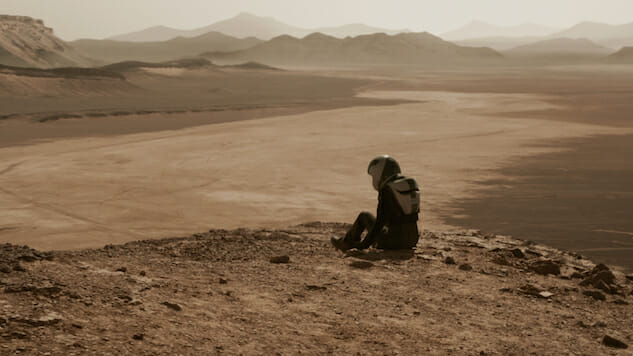In Season Two, National Geographic’s Mars Takes a Giant Leap, and It Pays Off
Photo: National Geographic/Richard Donnelly
Time was, science fiction about alien colonization presumed the invasion would come to Earth, from Mars. These days, the assumption has been turned on its head: The aliens are from Earth, and founding colonies on the Red Planet. And there’s less and less fiction involved in that idea. It very much appears that we will be off-planet in my children’s lifetime, and quite possibly in mine. This idea thrills a lot of people.
It makes me feel like I can’t breathe.
In January, National Geographic, in their typical and wonderful seeker’s spirit, sent me and a cohort of journalists to Space Camp in Huntsville, Ala., fulfilling a lifelong ambition I didn’t realize I had, for a simulated look at what being a space explorer might be like. (Space Camp is amazing.) We had a blast (as it were) designing heat shield technologies from household items and simulating a trip to the International Space Station, but the experience definitely confirmed my suspicions that I would be the world’s worst astronaut. Curiosity and courage and a command of engineering and physics? Those I could manage. But I don’t think there is any way of training someone to have the basic disposition of a space explorer—a sort of Zen master / fighter pilot hybrid with zero percent existential angst and an ironclad conviction that what you are doing will benefit humanity. Yes, it was deeply satisfying to say “Houston, we have a problem,” but even when I knew it was a simulated problem the anxiety wasn’t simulated at all. Feeling like I might tank the mission was a two-day adrenaline spike. Intellectually, I knew it wasn’t real, that I wasn’t going to crash a spacecraft, blow up the Moon, or subject a bunch of people I barely knew to lethal radiation levels. But emotionally, it was surprising how real it got.
Later, I exchanged a couple of emails with a real-life PAYCOM (responsible for air-to-ground communication with astronauts; basically the person you are talking to when you inform Houston you have a problem). I asked her how she felt about the idea of colonizing Mars. She said she thought it was terribly exciting. I asked if it made her at all… sad. She found that question rather strange. But in all honesty, I don’t approach shows like Mars with a sense of excitement and wonder. I brace myself for existential despair. She asked me why, and I said I might spend the rest of my life looking for a way to articulate that.
Mars is a different kind of colonization show than, say, The First or The Expanse. It’s a hybrid, part scripted drama and part docuseries, shifting between characters in the not-too-distant future establishing a Mars colony, and discussion among thinkers, scientists, technicians, historians, and entrepreneurs who have a lot to say about how it will likely happen. For National Geographic, forays into fiction are unusual, and the form is fairly experimental. In the first season, the series was fascinating and beautifully produced, but it also sometimes seemed anxious to prove itself by its documentary credentials—the drama-to-documentary shifts were rapid enough to border on intrusive, delaying real engagement with the characters. Right when some significant narrative development arrived, you’d be shunted back to footage of SpaceX employees or an interview with Neil DeGrasse Tyson. All equally interesting, to be sure, but it sometimes felt like an important conversation that kept getting interrupted.
In Season Two, Mars has done precisely what its own Martian pioneers have done: It’s acclimated. It retains what was good about the first season—Ron Howard’s deft and high-quality production; an impressive roster of experts; interesting and likable characters; and above all a very compelling high concept—but it feels much more comfortable with itself, and transitions much more smoothly between present-day experts and the fictional future. The acting is stronger than in the first season—I have such a crush on Jihae, the singer and multimedia artist who plays mission participants/twin sisters Hana and Joon Seung—and the improved balance of scripted and documentary elements has largely shed its earlier tang of self-justification.
-

-

-

-

-

-

-

-

-

-

-

-

-

-

-

-

-

-

-

-

-

-

-

-

-

-

-

-

-

-

-

-

-

-

-

-

-

-

-

-








































